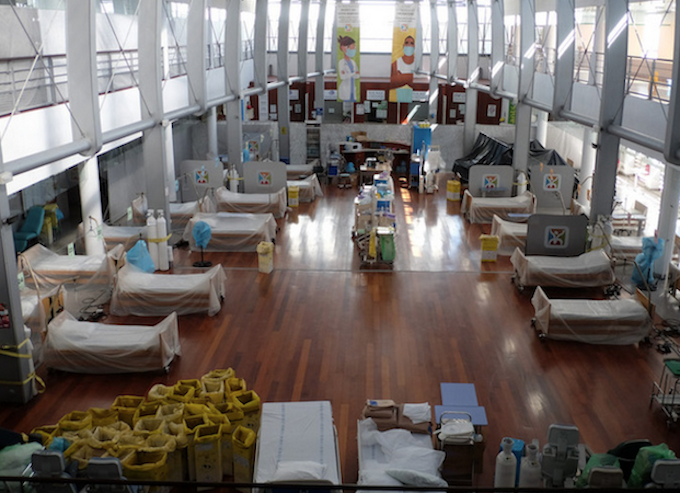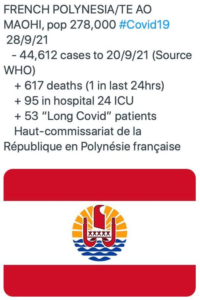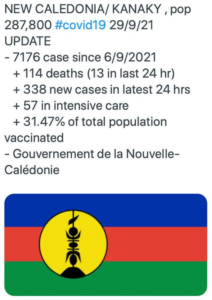
COMMENTARY: By Ena Manuireva with Tony Fala
In imperial and colonial contexts, dominant groups express their power in three ways: colonisation of the bodies of the minority groups (slavery and labour exploitation); colonisation of territories and natural resources; and colonisation of the mind (colonised peoples internalising the values of the dominant power).(1)
All three ways of exerting power were forced upon the population of Mā’ohi Nui from the beginning.
A French protectorate was enforced over the Mā’ohi Nui people by military occupation, imposed over the Mā’ohi Nui territories via a 30-year French nuclear testing programme, and imposed on the minds of local indigenous people through a political system called Autonomie Interne (Internal Autonomy) — a system that has shown its limitations and now seems to be on a ventilator.
- READ MORE: The covid-19 pandemic in ‘French’ Polynesia
- The New Caledonia covid crisis
- Tahiti’s ‘wedding of the year’ turns into political row over covid hypocrisy
The covid-19 pandemic that hit the world nearly 2 years ago has become a Trojan horse for the French state to physically colonise and occupy Mā’ohi Nui further.
The arrival of the pandemic in Mā’ohi Nui was attributed to a Tahitian lawmaker coming back from Paris in March 2020, and our first deceased were an elderly Tahitian couple in September 2020.
Borders were not completely closed. Exchanges of people, goods, and services continued between Mā’ohi Nui islands and between the island groups and people travelling from international destinations.
Travel continued even if it was somewhat reduced in a piecemeal programme led by local Mā’ohi Nui government authorities that included partial confinement.
Pape’ete marketplace
The decision to keep the popular marketplace in Pape’ete open during week days but closed on Sunday is one example of the local government’s mismanagement of the crisis — the virus does not take time off.
Allowing people to attend religious services is to think, naively, that worshippers will religiously follow the distancing instructions.
Going back to my last article for Asia Pacific Report about the impact of covid 19 on the Mā’ohi Nui population, on 13 August 2021, the number of death and patients in ICU (Intensive Care unit) were respectively 176 and 26.
The month of August was the deadliest for the populations of Mā’ohi Nui with 513 deaths and 59 patients in ICU with the hospital struggling to cope with the sheer volume of patients.
This tells us that 337 Mā’ohi people died in a single month.
Those figures are unacceptable for a population that is geographically isolated and should have been better protected and impervious to any types of pandemic. Sadly, the bar of 600 deaths was passed recently.

PPE provision
What did the French state and the local government do to halt the surge of the pandemic?
Vaccinations and Personal Protective Equipment (PPE) were provided to the population, but heavy equipment such as ventilators were sadly lacking at the main hospital.
However, in the middle of the pandemic in July, President Emmanuel Macron came for a presidential visit to Mā’ohi Nui with about 250 of his own staff.
Macron wanted to show support for the appalling local health situation, but it is hard not to believe that the looming presidential election in 2022 did not influence his visit.
While demonstrations and gatherings were prohibited as part of the means to both curb the virus spread and silence the gathering of Mā’ohi Nui independence demonstrators, the Tahiti-Fa’aa airport tarmac was busy welcoming Macron — with the local President Édouard Fritch leading the welcoming committee.
Covid-19 social distancing protocols were ignored during Macron’s 5-day visit in Tahiti and on the other islands where he mingled with the crowd.
Before the arrival of President Macron, the pro-French local government found enough time to call a parliamentary session to push through the change of the local name of the main hospital Ta’aone to that of former French president Jacques Chirac.
Self-congratulatory speech
Although the privilege to change names of buildings is one held by the local government, it begs the question whether this decision to rename the building was done for political expedience to please Macron who visited the hospital.
He gave a self-congratulatory speech about France coming to the rescue of Mā’ohi Nui while encouraging the populations to get vaccinated.
The work of the local Mā’ohi Nui government and Macron illustrate how an implicit colonisation process works, and is a remarkable illustration of a history of subjection of the Mā’ohi Nui people to external forces.
Similarly, the behaviour of both the local Mā’ohi Nui government and Macron here cast illumination upon the dispossession of Mā’ohi Nui people’s cultural agency and authority.
In many instances, the indigenous names are disregarded and replaced by the names of colonisers with the support of the local government.
The complacency and complicity of members of the local government with the French state regarding covid-19 restrictions has resulted in a kind of 2-tier justice system where those close to the colonial power seemed to enjoy prolonged freedom from judiciary prosecutions — or hope to be exempt from them.
By contrast, the rest of the Mā’ohi population are fined on the spot for not adhering to legal directives.
Stark disparity
An invasion under the guise of humanitarian assistance for the Mā’ohi Nui population.
There was a stark disparity that was noticed by the media and the population in Tahiti between the way emergency measures were applied in Mā’ohi Nui and Aotearoa.
New Zealand Prime Minister Jacinda Ardern acted swiftly and decisively to impose a complete lockdown after the discovery of just one case of the delta variant.

Similarly, people in Mā’ohi Nui noticed the disparity between the way the covid-19 emergency was dealt with in Mā’ohi Nui and New Caledonia.
Sharing the same French colonial system of governance as Ma’ohi Nui, French authorities in New Caledonia declared a state of emergency on September 7.
The New Caledonian government has been very decisive in handling the delta variant that has already killed 33 people.
Could it be that those drastic and stricter decisions imposed by the French High Commissioner (in charge of security) were to protect the 24 percent of the New Caledonian population who are French?
The hecatomb
New Caledonia has seen the Polynesian scenario in Ma’ohi Nui and they call it a hecatomb — a public sacrifice.
It was only when the number of deaths reached around 500 that a state of emergency was declared in Mā’ohi Nui — with a catastrophic death rate averaging 11 deaths a day especially during the month of August.
Only on the promise made by the French Minister of Foreign Affairs did we start seeing the arrival of a contingent of French health experts (nurses, doctors and firemen) numbering nearly 300 two weeks ago.
Did we need to get to that degree of desperation before we activated the emergency measures with that many French nationals arriving in Mā’ohi Nui? It might be good to remind ourselves that only 8 percent of the population are French and over 85 percent of the dead are unvaccinated Mā’ohi people.
It is easy to see how the handling of the security and health of the Mā’ohi nation was unjust and scandalous from the very start while New Caledonia pulled out all the stops to cater for the safety of its population — two very different justice systems.
Another important consequence of the hospitals being overwhelmed by the number of cases and deaths was the ban by the health authorities preventing families from holding a vigil besides their own dead.
This ban pressured families into not declaring that they might have other family members contaminated with covid-19 to hospital authorities.
Being able to say their last goodbyes was more important for the bereaved families.
While the official figures of those who died at hospital are recorded, the number of those who died at home remains unknown.
It is a sad state of affairs to witness such a disparity in the treatment of the indigenous peoples by the colonial authorities which call for justice and can only fuel support for independence among the Mā’ohi Nui people.
Ena Manuireva, born in Mangareva (Gambier islands) in Mā’ohi Nui (French Polynesia), is a language revitalisation researcher at Auckland University of Technology and is currently completing his doctorate on the Mangarevan language. He is also a campaigner for nuclear reparations justice from France over the 193 tests staged in Polynesia over three decades.
Note:
1. Phillipson, R. (2012). Imperialism and colonialism. In B. Spolsky (Ed.), The Cambridge Handbook of Language Policy (pp. 204-225).











































